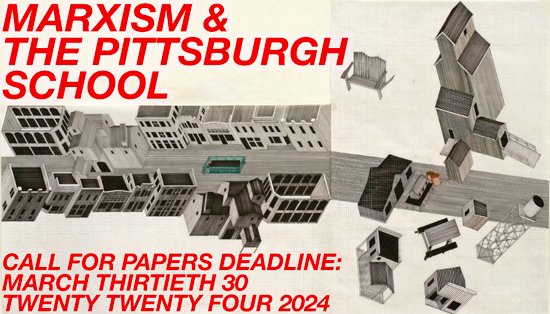&

Organized by The New Centre for Research & Practice & The Centre for Philosophy of Education at the Institute of Education, University College London
Dates: June 10th, June 11th, June 12th, 2024
Keynote speakers: Amanda Beech, Ray Brassier, Vanessa Wills
We live in a time of a renewed interest in Marx and in Marxism. Marx is now being read as having an ecological critique of capitalism, as being keenly interested in non-Western societies, and as having recognized the ambiguity of technology for human liberation. The successors of value-form theory have advanced the issue of abstract domination. New theories of class, and of ideology are also on the rise, foregrounding the friction between what is and what appears. Interest in Marx’s political thought is revived in tactically and strategically oriented theories of political organization. In tandem with this, the logics of the social world are pluralized in recent works, enabling a new understanding of social form, its compulsory character, the traction of the mode of production on the constitution of subjectivities, and the role of real abstraction. Psychoanalytic theories of the unconscious find in the concept of estrangement a common ground with Hegel and Marx, ushering in a new wave of Freud and Lacan influenced Marxism. Lively debates about the nature of abstract labor, discuss its historical and logical sources, and compatible theories of transition. The "communist hypothesis" finds new formulations.
This renaissance in serious readings of Marx parallels the rise of the so-called "Pittsburgh School" (Sellars, McDowell, Brandom, etc.) of analytic, neo-pragmatist philosophy. While the rejection of German Idealism might be seen as a foundational gesture in early analytic philosophy, the Pittsburgh School has revived interest in Kantian and Hegelian themes within a broadly naturalistic context. If previous forms of Analytic Marxism (Cohen, Elster, Roehmer) remained faithful to the analytic rejection of dialectics, the Pittsburgh School enables the recasting of Hegelian thought within a new form of semantic holism. The Pittsburgh School advances understandings of human action that problematize both "the causal" and "the normative" (and the relationship between them) in ways that could inform Marxist understandings of "the natural" and "the social." It activates conceptual tools from pragmatism, emphasizing the dimension of practice in concept use- offering possible new understandings of "praxis." It thinks through the dimension of concept-revision and world pictures, offering tools for developing more precise concepts of ideology. If, as Rorty once said of Brandom, his work "can usefully be seen as an attempt to usher analytic philosophy from its Kantian to its Hegelian stage," the question that now presses us is whether we can mobilize the resources of the Pittsburgh School to usher analytic philosophy from its Hegelian to its Marxist phase? Further, can Marxist thought gain insight into its own categories through an engagement with the thinking of Sellars, Brandom, McDowell, and related thinkers?
Following recent interest in the synergies and contradictions between these two traditions, we aim to build a dialogical space between Marxism and the Pittsburgh School in this conference and thus extend this call for papers.
Suggested topics include:
- How does Marxism complicate or challenge the Sellarsian distinction between “the space of reasons” and “the realm of law”?
- How should Marxism be positioned with respect to “the manifest image” and “the scientific image”?
- Can the space of reasons encompass dialectics?
- How might Marxists critically assess McDowell’s distinction between “first nature” and “second nature”?
- What might a Marxist reading of Brandom’s Hegel look like? Does Brandom’s Hegel invite or foreclose such a reading?
- Is there a bridge from rule-following to a Marxist pedagogy?
- What kinds of traction can world pictures constituted within the space of reasons have in changing the reality of social relations?
- How could the Pittsburgh School contribute to our understanding of ideology?
- How do Marxist and Sellarsian conceptions of science relate, and is the latter compatible with historical materialism?
- How could one accommodate real abstraction within the categorial fabric of a Pittsburgh-influenced approach?
Please send a 500 word abstract by 30th March to: submissions@marxismandpittsburgh.org.
Preference will be given to submissions from presenters who can commit to attending the conference in person in London. We believe that direct interactions and networking at the conference venue will enhance the sharing and generation of knowledge among participants. That said, we understand that global circumstances and personal constraints might limit physical attendance for some. With that in mind, we will also accept a select number of strong submissions for online presentations, especially from individuals residing in the Global South. We strive to highlight and encourage contributions that bring forth varied global perspectives and experiences. So don't be discouraged to send a proposal for consideration. We are flexible.
To register, please fill our registration form.
IMAGE: Siah Armajani, Tomb for John Berryman, 1972–2012
To see The New Centre Refund Policy CLICK HERE.